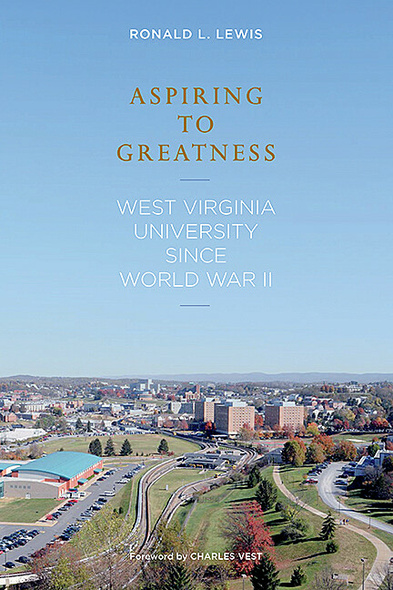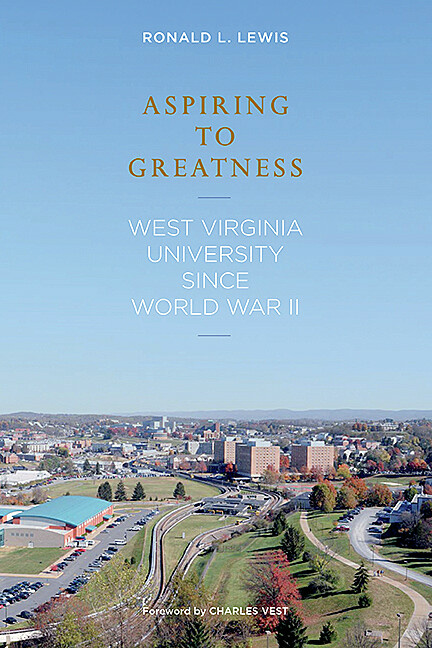Aspiring to Greatness
West Virginia University Since World War II
By RONALD L. LEWIS; Foreword by Charles Vest
West Virginia University Press, West Virginia University
Aspiring to Greatness: West Virginia University since World War II chronicles the emergence of WVU as a major land-grant institution. As a continuation of the work of Doherty and Summers in West Virginia University: Symbol of Unity in a Sectionalized State, this book focuses on the modern historical developments that elevated WVU from a small regional institution to one of national prominence. As the only modern history of West Virginia University, this text reaches into the archives of the President’s Office and makes exhaustive use of press accounts and interviews with key individuals to produce a detailed resource for alumni, friends, and supporters of WVU, as well as administrators and specialists in higher education.
West Virginia University’s growth mirrors the developmental eras that have shaped American higher education since World War II. The University’s history as an innovative, pioneering force within higher education is explored through its major postwar stages of expansion, diversification, and commercialization.
Institutions of higher education nationwide experienced a dramatic increase in enrollments between 1945 and 1975 as millions of returning World War II and Korean War veterans took advantage of the GI Bill of Rights. Their children, the “baby boom” generation, continued to supply the growth in college enrollment and the corresponding increase in institutional complexity until the mid-1970s. During this period WVU followed the national trend by growing from a few thousand students to nearly fifteen thousand.
From 1975 to the early 1990s, expansion gave way to diversification. The traditional student population stopped growing by 1975, and “boomers” were replaced by students from nontraditional backgrounds. An unprecedented gender, racial, and ethnic diversification took place on college campuses, a trend encouraged by federal civil rights legislation. To a lesser degree WVU was no exception, although its location in a rural state with a small minority population forced the University to work harder to attract minorities than institutions in proximity to urban areas.
The commercialization of higher education became a full-fledged movement by the 1990s. Major changes, such as globalization, demographic shifts, a weak economy, and the triumph of the “market society,” all accelerated the penetration of business values and practices into university life. Like other public universities, WVU was called upon to generate more of its own revenues. The University’s strategic responses to these pressures reconstructed the state’s leading land grant into the large complex institution of today.
Ronald L. Lewis received the BA degree from Ohio University, and earned the MA and the PhD in American history from the University of Akron. He taught at the University of Delaware for eleven years (1974-1985) prior to becoming professor of history at West Virginia University in 1985. At WVU he chaired the Department of History for six years (1989-1995), was appointed Eberly Family Professor of History (1993-2001), and then Stuart and Joyce Robbins Chair in History in 2001, a position he held until his retirement in 2008. He is currently professor emeritus and Historian Laureate of West Virginia. Lewis is the author of five books, co-editor of dozen volumes, and has published numerous journal articles, book chapters, and essays. In retirement he continues to reside in Morgantown with his wife Susan and canine companion Maggie.
Charles Vest is President Emeritus and Professor of Mechanical Engineering at the Massachusetts Institute of Technology. A native of Morgantown, Dr. Vest earned a B.S. in mechanical engineering from West Virginia University in 1963, and M.S.E. and PhD degrees in mechanical engineering from the University of Michigan in 1964 and 1967, respectively. He serves on the boards of several non-profit organizations and foundations devoted to education, science, and technology. Since 2008, he has been a member of the West Virginia University Board of Governors. He has authored a book on holographic interferometry, and two books on higher education. He has received honorary doctoral degrees from seventeen universities. He was awarded the 2006 National Medal of Technology by President Bush and received the 2011 Vannevar Bush Award from the National Science Board. He currently serves as the President of the National Academy of Engineering.
Charles Vest is President Emeritus and Professor of Mechanical Engineering at the Massachusetts Institute of Technology. A native of Morgantown, Dr. Vest earned a B.S. in mechanical engineering from West Virginia University in 1963, and M.S.E. and PhD degrees in mechanical engineering from the University of Michigan in 1964 and 1967, respectively. He serves on the boards of several non-profit organizations and foundations devoted to education, science, and technology. Since 2008, he has been a member of the West Virginia University Board of Governors. He has authored a book on holographic interferometry, and two books on higher education. He has received honorary doctoral degrees from seventeen universities. He was awarded the 2006 National Medal of Technology by President Bush and received the 2011 Vannevar Bush Award from the National Science Board. He currently serves as the President of the National Academy of Engineering.
Foreword, Charles Vest
Preface
Part I The Emergent University: Expansion, 1946–1967
Chapter 1. The Past as Prelude: Politics of Governance before the Board of Regents
Chapter 2. Irvin Stewart and the Creation of a University “Both in Theory and Fact”
Chapter 3. Paul A. Miller and “The People’s University,” 1962–1967
Chapter 4. Student Affairs: The “Silent Generation”
Part II The Constrained University: Diversification, 1967–1995
Chapter 5. Politics of Governance under the Board of Regents
Chapter 6. The Administrations of James G. Harlow and Gene A. Budig
Chapter 7. The University at Its Nadir
Chapter 8. Neil S. Bucklew, Modernization and Reform
Chapter 9. Faculty, Research, and Economic Development
Chapter 10. In Pursuit of Fairness and Diversity
Chapter 11. Student Culture Takes a Left Turn
Chapter 12. The Game Changes: Intercollegiate Athletics
Part III The Corporate University: Commercialization, 1990–
Chapter 13. Politics of Governance since the Board of Regents
Chapter 14. David C. Hardesty Jr., Self-Governance Restored
Chapter 15. The University as a Research Enterprise
Chapter16. The Robert C. Byrd Health Sciences Center
Chapter 17. Becoming a Student-Centered University
Chapter 17. Becoming a Student-Centered University
Chapter18. Intercollegiate Sports and the Marketplace
Chapter 19. Playing on the National Stage: Corporatism and Intercollegiate Athletics
Afterword
Notes
Index (to come--freelance)
About the Authors





